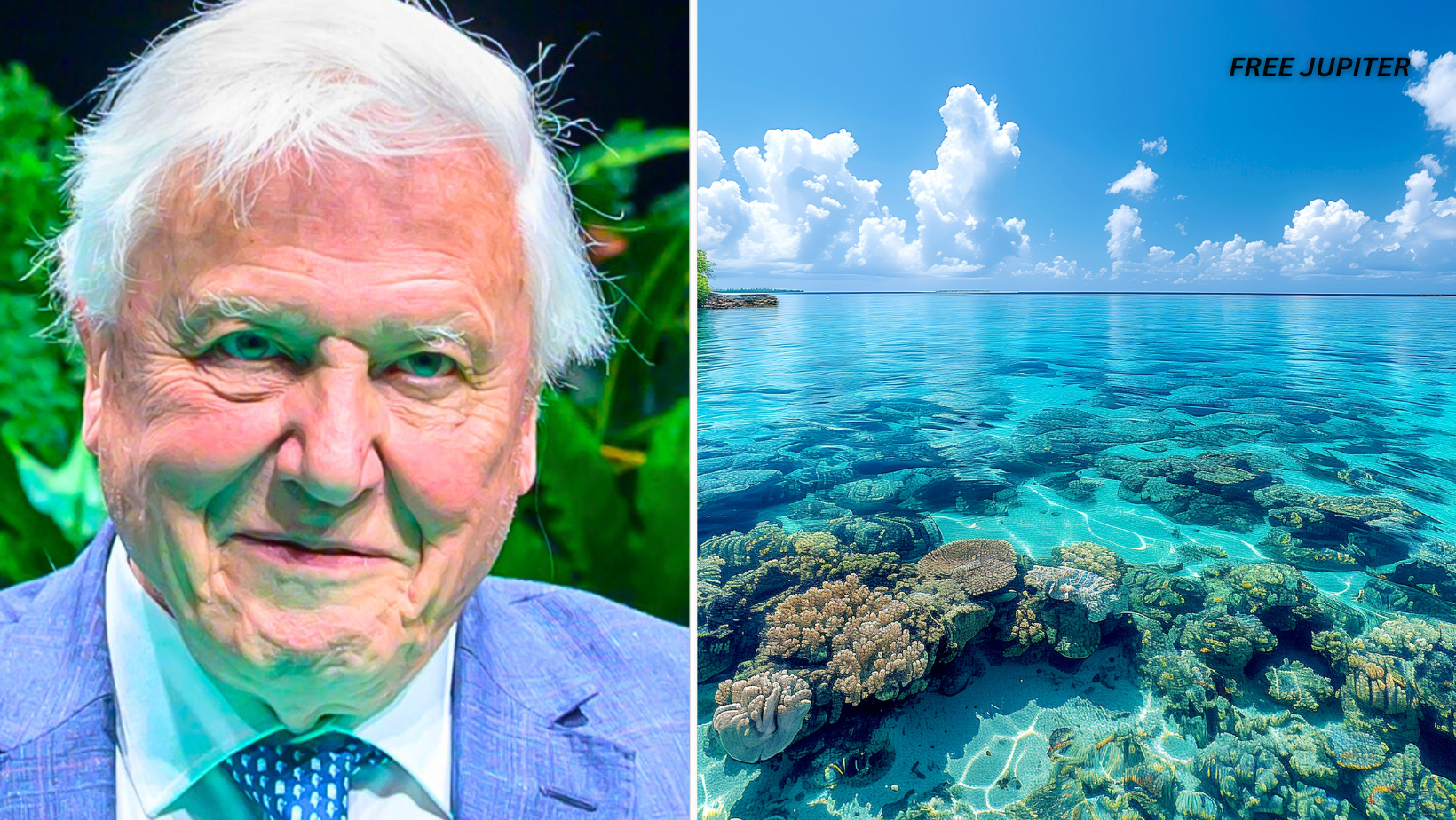Friendly Note: FreeJupiter.com shares general info for curious minds 🌟 Please fact-check all claims—and always check health matters with a professional 💙
As Sir David Attenborough approaches his 100th birthday, he unveils what he considers the most urgent message of his illustrious career through his latest documentary, Ocean. This film is more than a nature documentary; it is a powerful appeal to protect the Earth’s oceans, which Sir David now regards as the planet’s most critical environment.
A Shift in Perspective: The Ocean as Earth’s Lifeline
Reflecting on nearly a century of life, Sir David has come to a profound realization: the ocean, not the land, is the most vital part of our planet. Serving as Earth’s life-support system, the ocean regulates climate, supports biodiversity, and provides sustenance for billions. The film emphasizes that the oceans are at a crossroads, facing unprecedented threats but also holding immense potential for recovery if decisive action is taken.
A Star-Studded Premiere with Royal Endorsement
The film’s debut took place at London’s Royal Festival Hall, an event marked by the presence of King Charles and Prince William. The King expressed amazement at Sir David’s approaching 99th birthday, highlighting the naturalist’s enduring vitality. Alongside members of the royal family, the premiere attracted a host of celebrities including singer Geri Halliwell-Horner, astronaut Tim Peake, musician James Blunt, and model Cara Delevingne. Prince William also attended a special matinee screening with hundreds of schoolchildren, underscoring the film’s educational importance.
Not Just Another Nature Film: The Greatest Message Ever Told
Producer Toby Nowlan describes Ocean as distinct from previous Attenborough documentaries. Unlike his earlier works that often revealed new animal behaviors or pristine natural scenes, this film delivers a critical message about humanity’s impact on the oceans and the urgent need for conservation. It documents how the state of the oceans and our understanding of their vital role have evolved over Sir David’s lifetime.
Read more: Experts Reveal the 3 Most Spiritually Heightened Birth Months—Is Yours on the List?
A Personal Journey Beneath the Waves
Sir David recounts his first scuba dive on the Great Barrier Reef in 1957, a moment that left him breathless with wonder. This experience ignited a lifelong passion for the sea. However, since that time, the ocean’s health has deteriorated dramatically. The film warns that time is running out to reverse the damage caused by human activities.
The Devastating Impact of Bottom Trawling
One of the film’s most compelling sequences exposes the destructive practice of bottom trawling. This fishing method involves dragging heavy chains across the seabed, devastating habitats and indiscriminately catching marine life. Sir David highlights the staggering wastefulness of this practice: over 75% of the catch is discarded, often dead or dying. The disturbance also releases large amounts of stored carbon dioxide, contributing to climate change. Despite these harms, bottom trawling remains legal and is even encouraged by some governments, underscoring the urgent need for policy reform.
Hope Amidst Crisis: The Ocean’s Remarkable Capacity for Recovery
Despite the bleak outlook, Sir David’s message is ultimately hopeful. He shares what he calls the “most remarkable discovery” of his career: the ocean’s ability to recover is far greater than previously believed. The resurgence of whale populations provides a powerful example. In the 20th century, nearly 3 million whales were killed, pushing many species to the brink of extinction. Blue whales, for instance, were reduced to just 1% of their original numbers. Sir David once feared these giants were lost forever. However, following the 1986 global ban on commercial whaling, whale populations have rebounded significantly, offering a beacon of hope for ocean conservation.
A Lifelong Partnership: Creativity and Commitment
Keith Scholey, one of the film’s directors and a collaborator with Sir David for over 40 years, praises the naturalist’s enduring energy and creativity. Their partnership began in 1981, shortly after Sir David left his role as BBC director of programmes. Scholey notes that working with Sir David is both inspiring and challenging, a creative process that continually pushes boundaries.
A Global Call to Action: Protecting One-Third of the Oceans
At the heart of Ocean is a call to action. Nations worldwide have pledged to protect 30% of the world’s oceans, a goal that Sir David urges leaders to fulfill at the upcoming United Nations conference. He believes this commitment could be transformative, allowing marine ecosystems not only to recover but to thrive beyond anything seen in recent history.
Read more: Scientists Say This “Forgotten” Gut Factor Could Be the Real Cause of America’s Digestive Issues
The Ocean’s Role in Climate Stability
A healthier ocean ecosystem would enhance its ability to absorb carbon dioxide, a key factor in mitigating climate change. Scientists agree that protecting marine environments is essential to stabilizing the global climate. Sir David frames this moment as a unique opportunity to safeguard the planet’s climate, food security, and overall well-being.
Technological Advances Supporting Ocean Conservation
The film also highlights how modern technology offers new tools for ocean protection. Autonomous underwater vehicles explore previously inaccessible depths, while artificial intelligence and acoustic monitoring track fish populations and detect illegal fishing activities. Satellite imagery supports enforcement of marine protected areas, and drones provide detailed biodiversity assessments. These innovations enable more effective conservation strategies and greater transparency.
Community and Scientific Initiatives Driving Change
Initiatives such as Geographic’s pristine seas project and the Rev Ocean campaign integrate cutting-edge scientific data with community engagement. These efforts create scalable models for marine conservation that balance ecological needs with human livelihoods. In regions like Scotland, predictive analytics and open-access platforms empower stakeholders to make informed decisions about marine management and restoration.
A Century of Discovery and a Future of Hope
Ocean stands apart from Sir David’s earlier works in its urgency and personal tone. It reflects on a century of exploration and discovery while emphasizing the critical need for immediate action. Sir David’s narrative combines awe-inspiring visuals with a clear-eyed assessment of the challenges facing the oceans.
The Final Message: A Chance to Protect Our Planet
As Sir David celebrates his 99th birthday, he remains a tireless advocate for the natural world. His new film invites audiences to witness the ocean’s story and join the global effort to protect it. In his own words, the ocean can “bounce back to life” if given the chance. This message of resilience and hope is a fitting legacy for a lifetime dedicated to illuminating the wonders of our planet.
Read more: Scientists May Have Located the “Missing Half” Of Universe’s Matter
Ocean in Cinemas Nationwide
Starting Thursday, Ocean will be available in cinemas across the country, offering viewers an opportunity to engage with one of the most pressing environmental issues of our time. Through stunning imagery and compelling storytelling, the film challenges us all to reconsider our relationship with the sea and to act in its defense.
This expanded article provides a comprehensive overview of Sir David Attenborough’s latest work, emphasizing the critical importance of ocean conservation while maintaining an engaging and eloquent tone. If you would like, I can also help tailor it further for specific audiences or formats.










